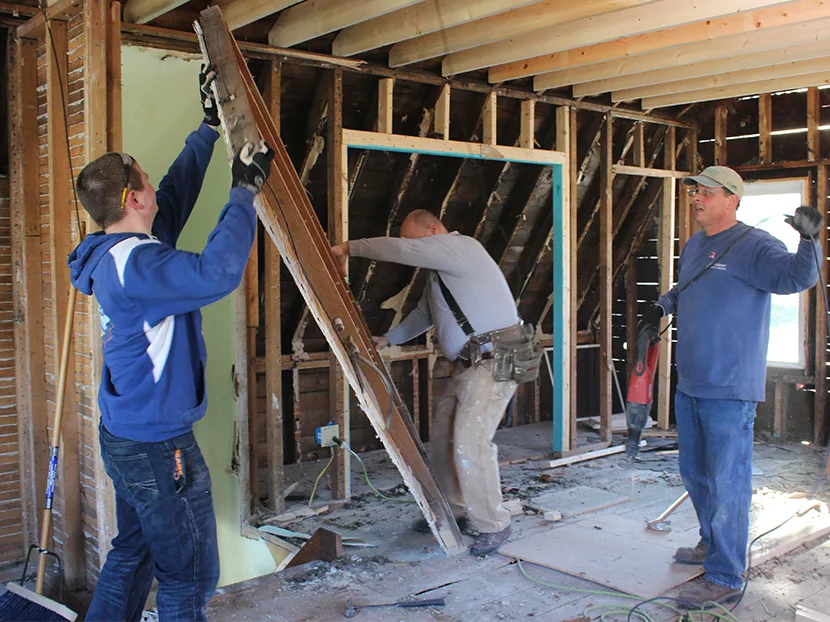In the last column, the first in this four-part series, I wrote about the importance of reminding students that careers in trades are rewarding.
Another way to positively influence the lives of young people, and expand appreciation for the trades, comes in the greatest form of generosity: through personal involvement that takes time and may also require a personal, professional and emotional or spiritual commitment, too.
The rewards are high.
“Giving back” can take many forms. As an example, I’d like to point to a man who takes this commitment to heart every day of the year.
Meet Jim Godbout; he’s the president of Jim Godbout Plumbing & Heating, based in Biddeford, Maine. He also is a past president of PHCC’s Maine chapter, and remains involved with the chapter through educational events that support the industry, especially those tailored to youth.
I’ve known Godbout for only three or four years, and in that short time, have come to appreciate his success and drive. I was most impressed with him as a living example of exactly how to give back to one’s community, and especially to young people — some of whom seek a trade career.
Godbout’s a family man. Married to Lynn for 34 years, today, their son Jonathan is a director for Builders of Hope, Int’l (www.buildersofhope.org), an organization that builds affordable housing throughout the world, though mostly in Africa. He and Lynn saw through their own experience just how important their role as parents has been. Of course, they’re still parenting, though they successfully fledged both now-grown kids and soon look forward to grand-parenting.
From their newer perspective as parents who’ve seen their own kids begin to trek independently into the world as smart, capable and well-adjusted young people, there’s one contrast that grows more apparent each year: the dissimilarity between their kids today, and the young people who weren’t raised in a nurturing home.
He sees a lot of kids from broken homes, and, frighteningly, they become more common each year.
“So, we start with ‘soft’ skills. Through role modeling and attention, we can gradually teach some of these truly at-risk kids how to improve their drive and motivation, which hopefully evolves into what so many people would regard as fundamental — like arriving to work on time, improving communications and respecting others,” Godbout says.
In Godbout’s experience, mentoring has become a valuable way to reach some of the toughest kids.
“One young man’s parents are addicted to drugs, but he sees that he doesn’t want to become like them. Today, he’s got everything to live for,” Godbout continues. “With some help, this young man made it through high school and just won a scholarship to attend post-high vocational school to focus on a career in building and construction. He’s upbeat and excited to begin this fall.
“Another young man — who grew up very differently, on a family dairy farm — sought out and responded very well to technical training in our plumbing and mechanical industry. Now, at 18 and a graduate of high school, he’s joining our firm part time.
“The shortage of mechanical trades is so obvious in my business every day. We’re now turning away about one-third of the calls we receive, favoring only current customers, or those within our network of customers. We simply can’t handle more work given the size of our staff.”
It’s already tough to impossible for Godbout’s business to handle the existing workload, because they don’t have enough technicians to go around. So, Godbout made the decision to halt growth and meet the obligations of the current customer base with the skilled labor force they now have in place.
And, yes, this means turning away a lot of installation and service work.
In their area of the country, the average age of a plumber/hydronic professional is 53. So, it’s a sad irony: they have an aging workforce providing services that our country cannot do without.
Sound familiar?
“Here at my firm, I have only 1 of 20 employees who’s less than 30 years old,” Godbout continues. “We’ve tried many times to hire tech school graduates, but unfortunately, many are great at providing licenses, but most lack real work ethic and experience.”
A few years ago, Godbout and other members of the local Rotary Club began working with local high schools in the surrounding area to develop a couple of programs he hopes will help to build great tradesmen within the communities.
An observation
“A large percentage of the new generation lacks work ethic and drive,” Godbout says. “If not already in place in some form, these are very tough to instill.”
To change that, Godbout has joined some business owners and school administrators while working on a co-op mentoring program to match students to members of the business community, much like he experienced years ago.
The program’s approach is simple; high school students meet the basic requirements of graduation while, at the same time, commit to learning some sort of trade. The added skills may be machining, electrical, carpentry, welding, auto repair or plumbing and HVAC, enabling general education students to at least have some exposure to the trades.
Remarkably, some of these students have discovered new sources of inspiration.
“It’s like a light goes on, and suddenly there’s a spark of excitement,” Godbout says.
Of course, mentoring also plays into this. It’s one thing for young students to have an opportunity to delve into the world of trade work, to see for themselves what may be a best match for them and to be inspired by it. But there’s another facet to the experience that can add dramatically to it: matching young people with trade pros who can share real knowledge with them, based on experience.
“Clearly, the best mentors are those who have a passion for their craft and love to share it with others,” Godbout continues.
Who are those trade pros? Think back to the teachers that most inspired you as a student. They were effective because they went the extra mile, instructed with creative flair, and they truly enjoyed interacting with students. They had a wholesome passion and drive to connect with young people, right?
Trade pro mentors may not be as hard to find as you might think:
• Do they enjoy telling stories?
• Do they enjoy being with and speaking with young folks?
• Are they passionate about their work, and is that communicated when they speak?
• Do they truly enjoy their job?
Consider, too, other parts of the equation: Low self-esteem at least has some roots in a student’s lack of inspiration. If inspiration doesn’t come from home, church or school, what’s the source?
Unfortunately, warns Godbout, many of us know all too well that the lure of drugs, alcohol or gang involvement lies right around the corner.
The consequences of no intervention are awful. It seems that every traditional approach has been taken to avert a crisis with so many dimensions, but it is happening.
“One of the most valuable answers, a solution — offering young people not only a way out, but a means to succeed and to build both skills and character — remains, mostly, untested,” Godbout says. “I’d yell ‘Give the trades a try, kids!’ from the roof of my building if I thought it’d do any good.”
So, please, get involved.
Make a difference by developing great young leaders to carry the mechanical torch. Let’s work together to stop the downward spiral of our labor force.
Finally, a footnote: Godbout’s Rotary Club already has an effort in place to involve state and federal pros, and funding, and business and hospital managers, too. 
Are you involved with your Rotary Club, and if so, have they developed programs for young people? If not the Rotary, maybe your place of worship or community center, has effective programs for kids. Are you involved?
Somewhere here is the making of an answer that may hold a starting point and a solution for you. Start the conversation with other business pros where you are — think local and grow out from there.
A favorite saying applies: Be remembered for what you do, not what you have.





